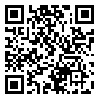
Scientific-Research Quarterly Journal of
Medical Science

year 9, Issue 18 (3-2025)
KJMS 2025, 9(18): 46-62 |
Back to browse issues page
Download citation:
BibTeX | RIS | EndNote | Medlars | ProCite | Reference Manager | RefWorks
Send citation to:



BibTeX | RIS | EndNote | Medlars | ProCite | Reference Manager | RefWorks
Send citation to:
Akbari E. Evaluation of the Effects of Aqueous Extract of Afghan Saffron on Morphine Withdrawal Symptoms in Rats. KJMS 2025; 9 (18) :46-62
URL: http://kjms.knu.edu.af/article-1-63-en.html
URL: http://kjms.knu.edu.af/article-1-63-en.html
Neuroscience research center, Kavosh institute, Kabul, Afghanistan
Abstract: (742 Views)
Introduction: Substance dependence is a global health concern with significant individual, economic, social, and medical consequences. Despite their efficacy, synthetic pharmacotherapies are often associated with undesirable adverse effects. Due to their lower cost, reduced side effects, and potential therapeutic role at various stages of addiction treatment, medicinal plants have drawn increasing attention from researchers in the field of health sciences. This study aimed to investigate the effects of the aqueous extract of Crocus sativus (Afghan saffron) on naloxone-precipitated withdrawal syndrome in morphine-dependent rats.
Materials and Methods: Morphine dependence was induced through subcutaneous administration over seven days in 13 incremental doses. The extract-treated groups received the aqueous saffron extract intraperitoneally at doses of 100, 150, and 200 mg/kg concurrently with morphine. To precipitate withdrawal syndrome, naloxone (3 mg/kg, i.p.) was administered two hours after the final morphine injection, and withdrawal behaviors were observed and recorded for 30 minutes.
Results: The findings demonstrated that the aqueous extract of Crocus sativus at doses of 100 and 150 mg/kg significantly attenuated withdrawal symptoms in morphine-dependent rats (P < 0.05).
Conclusion: The beneficial effects may be attributed to the extract’s modulatory influence on the GABAergic and dopaminergic neurotransmitter systems, as well as its anti-inflammatory and antioxidant properties.
Materials and Methods: Morphine dependence was induced through subcutaneous administration over seven days in 13 incremental doses. The extract-treated groups received the aqueous saffron extract intraperitoneally at doses of 100, 150, and 200 mg/kg concurrently with morphine. To precipitate withdrawal syndrome, naloxone (3 mg/kg, i.p.) was administered two hours after the final morphine injection, and withdrawal behaviors were observed and recorded for 30 minutes.
Results: The findings demonstrated that the aqueous extract of Crocus sativus at doses of 100 and 150 mg/kg significantly attenuated withdrawal symptoms in morphine-dependent rats (P < 0.05).
Conclusion: The beneficial effects may be attributed to the extract’s modulatory influence on the GABAergic and dopaminergic neurotransmitter systems, as well as its anti-inflammatory and antioxidant properties.
Send email to the article author
| Rights and permissions | |
 |
This work is licensed under a Creative Commons Attribution-NonCommercial 4.0 International License. |



